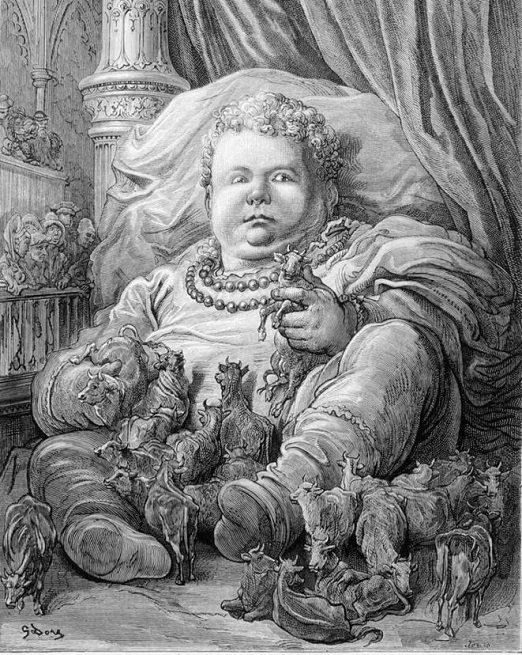Rable and his book "Pantagrüel and Gargantua" / part 3/
Prophecy is given to the one who can understand the music. Christ is often portrayed as the mystic citrus player, whose mythical predecessor is David. Tradition states that Christ, following the various poetic rhythms, sang all of the Scriptures, starting with the Old Testament, and ending with the New Testament. Erasmus has borrowed from Socrates the idea that philosophy is music sent to us. In the "Fifth Book," Rable introduces his newly enlightened heroes into a Vachian poetic delirium. In this state of intoxication, come uphill, they acquire the gift of prophesying. These final episodes in Raven's novel should be seen as a cheerful parody of the "transformational theology" praised by the Italian humanists Marsilio Fichino and Pico della Mirandola, who rediscover the wisdom of the ancient Greek philosophers (especially Plato and Aristotle) the lessons of the neoplatons.
Those who do not know the development of theological science before St. Thomas and the theological aristotelism will hardly penetrate the Third, Fourth, and Fifth Book of the Rable novel, which suggests many initiate mysteries. They will not be able to grasp the deep meaning of the Pantagrüel fleet's journey to the higher meaning of the word "d", in which the wild carnations - the flowers symbolizing the metamorphosis, which in the material world is subject to Alchemy, are harvested. Since the Renaissance, western thought has been exhausted in efforts to overthrow the "metaphysical principles" of scholasticism. It most often resorts to "historical categories" that are no less superficial than the pseudo-ontological concepts of Thomas's followers from Aquino. The struggle against "cheerful fables" gives importance to fragile wild carnations. The breakthrough in anthropology will be accomplished through the in-depth critique of common sense and the principle of identity that will reveal access to real anthropology, which will give scientists a real idea of the proliferation of murders and bloodshed in the Earth's Paradise of Reason.
First Book: The title imitates the storyline narratives about the suffering of "eternally miserable" knights - "A story about the gruesome life of the Father of Pantagrüel, ever made by Metro Alcobribas, the quintessential retriever." Since this part appeared two years after the book of Pantagruel, arranged in the final version of Rable 's novel as a poem, the author assured his readers that he would continue to entertain them with the strange tribulations of his good-hearted giants, adds the subtitle "A book full of pantangleism". Here the ambition of the French Renaissance novelist is to recreate, through a gesture of "giant order", the cosmos of the giants, describing it with a verbose surrender that must produce the comparison between the God-setting universe and the unfolding of its fictional Holy Writer. On the hard matter on which the world is built, Rable is opposed to a verbal word-of-mouth that melts the world of things and replaces it with the world of language. The world that builds through language proves to be much more complex, more varied, more dynamic, filled with cheerful parodies, witty irony, and ambiguous mind-giving and criticism. The reader walked into the reading of Rable 's novel and found himself in the fortress of his overflowing speech, which has his colorful protagonists - parodying mockers, jokers, jokes, word-players, and so on.
The rhetorical Rable 's rich and colorful speech penetrates everywhere - the earth and the sea, the mountains and the rivers, the arteries and the skeleton, the Scripture and the intellect, the brain and the skull, the wellbeing and the reproductive instinct, the stomach and the genitals. His word resembles a very agile and flexible genius who fits nicely into every body and intellect, turns into flesh and water, has no restraint to roam around the offal and faeces, enters the censored by the Church areas of human reproduction and sexual delight. It cleanses the minds of the people of the Middle Ages to the Renaissance from the theological notion of the world as a harmonious whole, the creation of the inexhaustible power of God, and as if it brings them back to the pagan myth of Pan, whose sensual and lively desire drives the world towards fruitful union and beautiful harmony.

@godflesh Sir... 💐 Actually the stories of old books help us teach today's digital society. The book is one of them This is an extraordinary story of rable's novel, "Pantagrüel and Gargantuan, adopting the story of a small child, @godflesh Sir, one of your stories is extraordinary, if we did not come to steemit then maybe you could not read your beautiful story, we could Everyone will wait a lot more beautiful text in the future, you will give us a gift
You got a 24.56% upvote from @upme thanks to @godflesh! Send at least 3 SBD or 3 STEEM to get upvote for next round. Delegate STEEM POWER and start earning 100% daily payouts ( no commission ).
EXCELLENT ..!
I LIKE THE ANCIENT STORIES
This is extremely worth the read...
Thanks a great deal
Good story bro.
Hi @godflesh. Thank you for joining the literature-Guild and for your contribution. You have been selected as a curator. Therefore all your posts tagged with #literature are automatically upvoted by the whole guild. Please use this responsibly helping to build trust within our community. Have a nice day. Kind regards, Literaturkritik